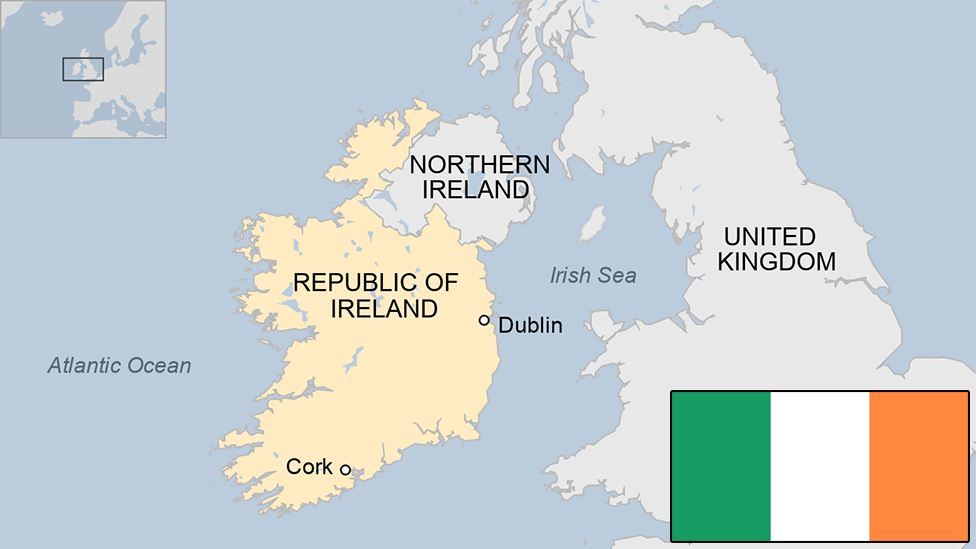Ireland exits bailout in better shape
- Published
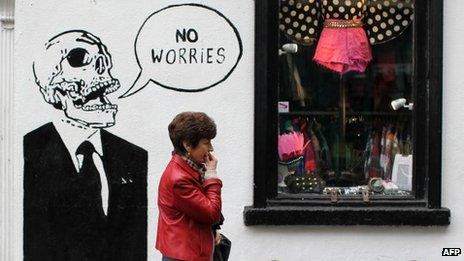
Ireland's bailout exit has boosted the mood in the country
Although Ireland's exit from the bailout programme does not in any way reduce the eye-watering level of debt it took on in 2010, it is hugely important, both inside and outside the country.
The sense of reliance on the troika of the EU, the IMF and the European Central Bank has been lifted, and the country, to an extent, has regained its economic sovereignty.
The view of Ireland held by other eurozone leaders is greatly improved.
The Irish enjoy their status as members of the common currency, and the excellent transport infrastructure across the country owes much to EU funding.
Ireland has atoned for the reckless lending of its banks. Its people have endured harsh new taxes, reductions in wages, jobs losses and heart-breaking levels of emigration, and they have done so without overt dissent or disorder on the streets.
Its prime minister Enda Kenny has been praised by German Chancellor Angela Merkel for implementing brutal cuts in public spending, and Ireland has proved to be the poster boy of the austerity she insisted upon.
The benefits are of course practical, as well as psychological:
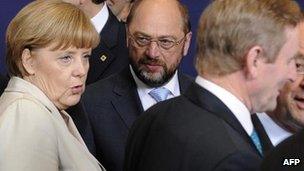
Angela Merkel insisted that Enda Kenny (right) impose austerity measures
Ireland has kept up its interest payments on the £57.4bn it was forced to borrow
The bailout has been rather like an endowment mortgage: the capital remains, but the government no longer needs to draw down cash from Europe
Ireland is funded for the year ahead, having already returned to the bond markets to borrow sufficient monies to run its services for 2014, but its status as an investment pariah has diminished
Interest rates on government bonds are manageable; some even describe them as favourable
During the bailout, unemployment reached 15%, but that figure has fallen month-on-month for almost a year-and-a-half.
Some small business owners feel the remarkable feature is that 85% of people managed to stay in work, given the crippling effects the bailout had on international trading.
Small to medium enterprises have had to shed staff, improve quality and many have been forced to close.
Some, however, take that typically Irish approach and now feel able to reflect on the benefits of the bailout.
One CEO, whose company managed to weather the storm, says that because banks stopped lending, he could not afford to buy new machinery, and had to balance his income and outgoings. While it has streamlined his workflow, it meant losing some valued colleagues.
Taoiseach Enda Kenny insists that exports are at an all-time high, due in no small part to the country's reliance on multi-national pharmaceutical companies.
A critical feature of Ireland's tentative recovery has been its low corporation tax rate, which is just over half that of the UK.
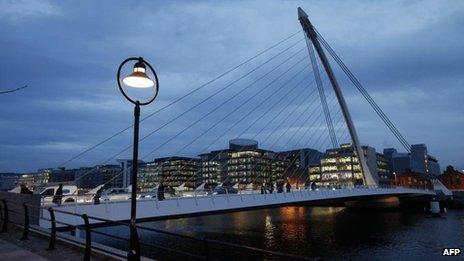
Ireland's low corporation tax rate has attracted international investment
Foreign direct investment is strong, benefiting from a well-educated workforce, and, in turn, adding skills.
The tech sector, particularly, is booming; hundreds of young people have joined the IT and social network giants who have headquartered in Dublin and Cork. Many spend a few years there, and leave with their own start-up ideas.
While there are many reasons to be cheerful, all of this masks the fact that Ireland has 300,000 fewer people than it did four years ago.
Of those who emigrated, 40% were Irish nationals, victims of the search for work.
Critics of the government's austerity plan say this explains the fall in unemployment.
There is also a ticking bomb in internal lending: about 100,000 mortgages are in arrears, prompting the troika to express concern about the precarious position of Irish banks.
Thousands will be forced to enter into personal insolvency agreements, whereby half of their mortgage will be parked, while they pay off the remainder.
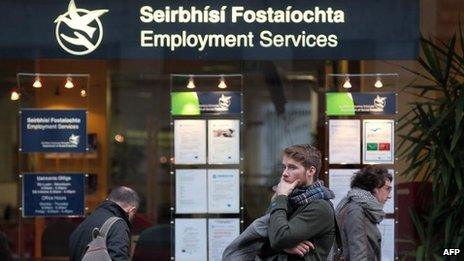
While unemployment has fallen, critics of austerity blame increased emigration
Ireland has chosen not to avail of a precautionary credit line from Europe, which is a signal of its economic confidence.
While the troika will continue to visit and scrutinise its finances, the man in charge of the public purse, Michael Noonan, is considered a steady hand at home and in Brussels.
Signs of recovery
The minister for finance is understated and unexcitable, and while many in Ireland despise the hurt they have had to endure over the past three years, there is an acknowledgement that the peak may have been reached.
When Ireland was bailed out in December 2010, few would have predicted an exit.
The talk then was that it would take generations to clear the debt. It still might, but the mood is different now.
There are solid signs of recovery. Empty office blocks are being bought up, and the tourism, retail and even construction sectors are beginning to re-employ people.
However, Ireland's debt mountain makes it particularly susceptible to shocks elsewhere in the eurozone. If the other bailout countries experience problems, faith in Ireland's recovery will waver.
Internal consumption is also a problem. New household outgoings include a property tax, and a hike in health insurance, which leaves some families struggling to find between 1,188 euros (£1,000) and 2,376 euros (£2,000) extra per annum, leaving less purchasing power across the country.
Appetite
Perhaps what Ireland has going for it most is the attitude of its people.
While the Ireland of the 1980s was an economically grim landscape of dole queues and wastelands across its main cities, these were later replaced by an insatiable appetite to develop every square foot of land and property.
One businessman who works in the vital agri-food sector says the future is bright, "as long as we play to our strengths and stop playing village pump politics".
He points out that Ireland has the longest grass-growing period in the world, and the supply of value added foods is as sustainable a business model as any.
Far Eastern economies may be struggling for proteins to feed their burgeoning populations. "Why do you think the Chinese keep visiting Enda Kenny?" he asks.
There is hope also that some of the money the government haemorrhaged into its banks may eventually be returned.
The Irish have been quietly arguing that its government only shored up the institutions temporarily, and that the EU stepped in just as it was due to get that money back.
A bailout was effectively imposed by Europe. Had the banks been allowed to fail, the crisis across the eurozone would have been much worse. If such a write-off were to occur, it could halve Ireland's debt.
Added to this is a growing sense in Ireland that the bailout better served faceless bondholders and investors than the Irish themselves.
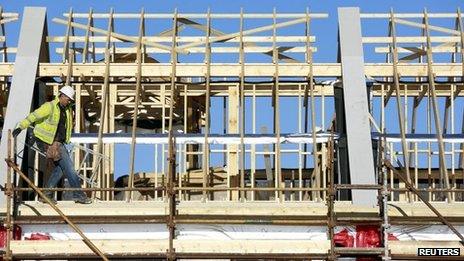
The construction sector was badly hit in the downturn but it has begun to re-employ workers
New research suggests that the bulk of the capital loaned by the Irish banks actually came from sources in the UK.
Increasingly the Irish are asking who was really bailed out in December 2010, and why have they been asked to pay for it?
That is an argument that could go on for years. In the immediate term though, the bailout exit is hugely positive.
The mood is improving, gradually, and the numbers appear to be backing up the government's spin.
It will be a slow burn, but barring external shocks, Ireland is in better shape than many would have predicted.
- Published13 December 2013
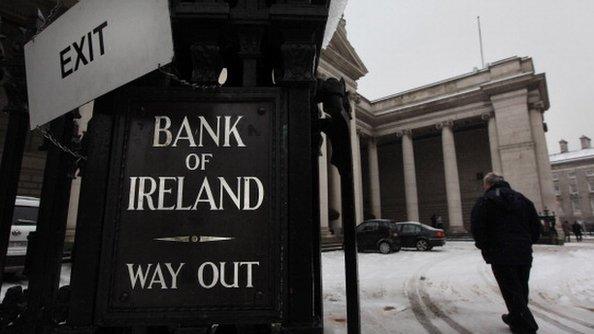
- Published12 December 2013
- Published14 November 2013
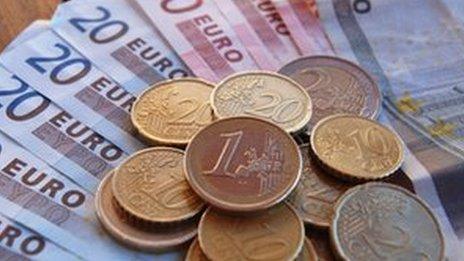
- Published31 October 2013
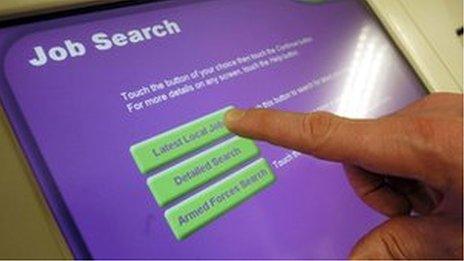
- Published28 October 2013

- Published7 February
